#TO HARVEY SPECTER LOVE AND LOYALTY ARE THE SAME THING. OKAY OKAY
Explore tagged Tumblr posts
Text

previous tags @katierosefun jesus fucking christ
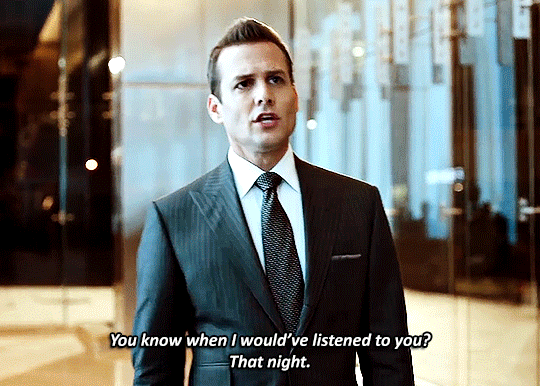

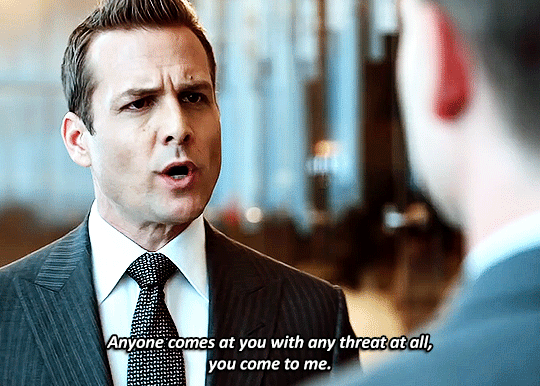
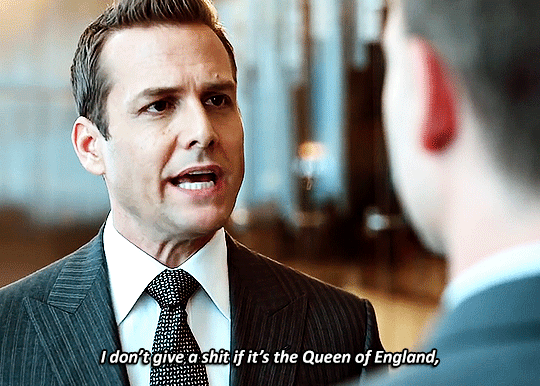
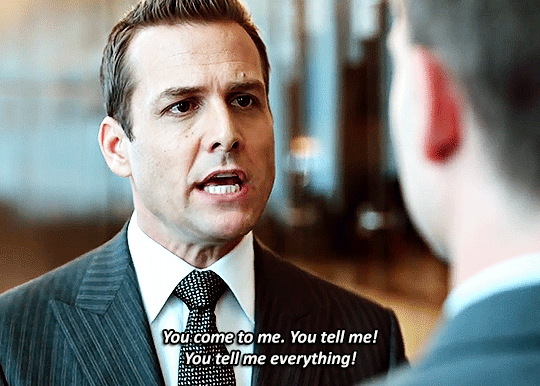
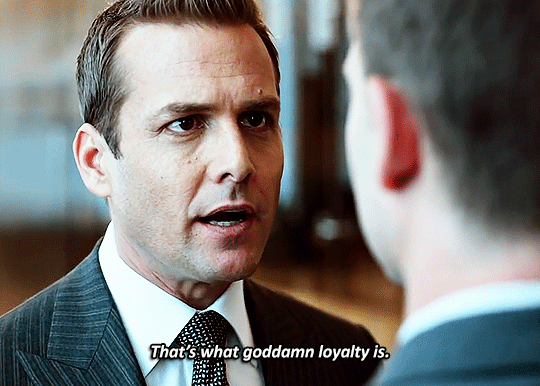
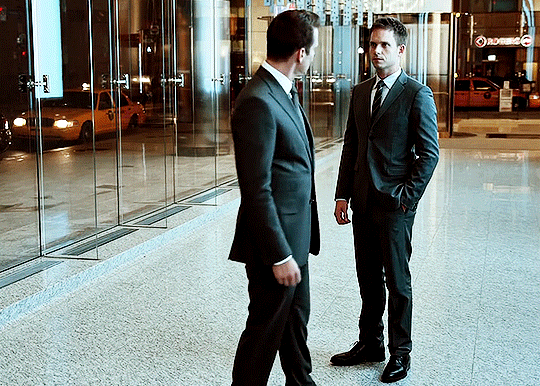
this was a confession of love btw
SUITS → 3x01 “The Arrangement,” dir. Christopher Misiano
#TO HARVEY SPECTER LOVE AND LOYALTY ARE THE SAME THING. OKAY OKAY#IM GONNA BE THINKING ABOUT THIS FOREVER
2K notes
·
View notes
Text
The Henrietta Farrow Charity Gala
Summary: “Next up in our talent show,” the announcer declares, “is another child of the legal world. Please welcome Harvey Specter, who will be performing a brand-new hit from Broadway!” . . . That’s not right.
Word count: 2.7K Rating: G Relationships: Marvey
Written for @suits100‘s 64th prompt: “At a social event (fundraiser, maybe) character A secretly puts character B on the list for the event’s talent competition.“
Harvey hands Mike his invitation to the Henrietta Farrow Charity Gala. “This right here is proof you’re making a mark on this city. I’ve already had Donna RSVP on your behalf saying you’d be thrilled to come--”
“But--”
“So go see Rene for a new tux.”
And with a grand wave of his hand, Harvey shoos Mike from his office.
He sighs and stops by Donna’s desk. “I know Harvey usually has the monopoly on being Bruce Wayne, but I’m really tempted to scream about fat spreads and society hags right now.”
“Oh, give it a break,” she chuckles. “Some of the money does actually make it to charity, and it’s fun.”
“It’s funding research on terminal illness, that’s the opposite of fun.”
“And even an hour of scientific speeches about dying a slow, painful death is funny when there’s that much champagne. Especially if you’re mostly sober and everyone else at your table is spilling their deepest secrets.” She winks.
“. . . Okay, I’m never going to get drunk while you’re around.”
“Smart puppy.”
To the extent that he can, Mike largely forgets about the ball, but he still picks up rumors and whispers around the office.
“Henrietta’s an 72-year-old ball of sass and seduction,” Norma tells him with a cackle. “We go waaay back.”
“Henrietta invites all the most respected lawyers and doctors and businessmen from around the city and then presses them for secrets, though whether for blackmail or personal pleasure, nobody can tell,” Katrina mutters to him. “That’s what the talent show’s for. And also the infrared cameras in the hedges and on the roof. She says they’re for ‘security,’ but I hear she only turns them on the night of the gala.”
“Henrietta’s my role model,” Donna sighs dreamily.
And so Mike ends up at the mansion of a geriatric woman who somehow terrifies him more than Jessica Pearson, checking his reflection in a hallway mirror and fidgeting with his bowtie.
“There you are, rookie. Brave choice, hanging a piece of non-representational art around your neck.”
Mike just throws him a look. “Ties are hard enough, but this thing’s outright trying to kill me.”
“Oh, for god’s sake--” Harvey takes Mike by the shoulders and turns him away from the mirror-- “I’ll do it.”
“But what about the cameras--” He cuts off his sentence as Harvey’s suddenly loosening the bowtie and re-tying it properly, practically caressing Mike’s neck.
“It’s because of the cameras that I can’t have you looking like an embarrassment,” Harvey replies a moment later, his smirk surprisingly gentle. Then he turns and strides back down the hallway, calling, “Isn’t that right, Henrietta?”
Mike just stares, unable to shake the feeling of having entered the Twilight Zone. He can still feel the prints of Harvey’s hands, warm on his skin.
Donna takes a seat by Mike, holding two glasses of champagne. “Would you like a drink?”
He eyes her briefly before accepting. “Is it just me, or is Louis acting more like a supervillain than usual?”
“It’s the talent show,” she explains. “He’s probably sabotaging whatever poor sucker’s going after him.”
“. . . Why?”
“Because he says that, in a talent show, one is judged not only by their own performance but by the performances of those immediately before and after him. And given that I’m before him . . .”
“He can only sabotage the person after him.” Mike shudders. “Well, good luck to you, at least.”
“I don’t need luck,” she replies with a wink. “I’m Donna.”
Louis’ bucktoothed smile grows even more prominent the nearer the competition draws. Mike tries to imagine what sort of attack he’s planned for his successor-- starting a slanderous rumor? Poisoning a cup? Literally breaking a leg? He tries to enjoy Donna’s monologue, an objectively brilliant piece of thespian magic, and Louis’ monologue, which sadly proves almost as impressive, but he can’t shake the feeling of foreboding.
“Next up in our talent show,” the announcer declares, “is another child of the legal world. Please welcome Harvey Specter, who will be performing a brand-new hit from Broadway!”
That’s not right. That can’t be right. Harvey Specter would never stoop to engaging in such a spectacle, and certainly not with musical theater.
Mike gapes at Donna, who is gaping at Louis, who stole his smile straight off the Joker. Then Mike shoots a glance at Harvey, who is wearing his impenetrable poker face as he gets up from his seat. The audience titters as he makes his way onstage, but Mike stays silent as he waits for his boss to take the mic, apologize for the mix-up, and drop out of the show--
He certainly doesn’t expect Harvey to stride up to the grand piano and shoo away the accompanist.
Harvey raises the piano’s lid and props it up with what Mike realizes is practiced ease, before sitting down on the bench and placing his hands over the keys. His fingers hover for just a moment, and Mike’s breath stops—
From the first measure there are cheers, because this song is from Hamilton, the show this whole city is obsessed with, tripping over itself for seats, treating the ticket lottery like it’s the Powerball. To be fair, Mike’s mildly obsessed with Hamilton himself, though he first approached the story through the Chernow biography. It’s a rags-to-riches story about an orphaned lawyer who rises through the ranks in New York on the strength of his genius—what’s not to love?
Mike recognizes the song at once—“Satisfied”—and he’s surprised. He would have pegged Harvey as more of a “My Shot” or “Non-Stop” guy, dallying briefly with “The Reynolds Pamphlet” or “Burn” when he’s on one of his loyalty kicks. Still, there Harvey Specter is onstage, playing the song of a discontented maid of honor watching the man she loves marry her sister. He’s doing an excellent job of it, too, playing from memory, and he keeps his expression calm and blank as he rolls smoothly through the intro.
The song itself devolves into controlled chaos as Angelica, the maid of honor, reflects on her past. Harvey has of course eschewed the lyrics, but he captures the building tension, pressing a pedal so that his notes start to run into one another— and then something snaps. The song turns suddenly spartan, almost clinical, a series of beats with all the spirit of a sewing machine.
I remember that night, I just might-- I remember that night, I just might-- I remember that, I remember that--
Mike murmurs the words as Angelica plunges back into full-bodied song, recounting a ball where innumerable suitors tried to impress her and her sisters, tripping over themselves to win their praise. Harvey too plunges into the music, weaving rich harmonies with his left hand, embellishing the main line with variations and grace notes and brief trills.
But Alexander, I'll never forget the first time I saw your face.
His stare flits from Harvey's fingers to his eyes, now drifting shut even as he presses forward, physically leaning into each chord he plays.
I have never been the same, Intelligent eyes and a hunger-pang frame, And when you said 'hi' I forgot my damn- dang name . . .
Mike blinks as he stumbles over the word, replacing Angelica's tame adjective with what Harvey would say instead.
Set my heart aflame, every part aflame, this is not a game.
Here Alexander enters a dialogue with Angelica, and Mike knows his part should feel low, smooth, suave. Yet there's a strange ping in how Harvey plays the notes. They're short and fresh, brazen and cheeky and somehow almost cute, even as Angelica's notes answer with a more mature, even-handed gravitas.
You strike me as a woman who has never been satisfied, Alexander announces.
Angelica replies, I'm sure I don't know what you mean, you forget yourself.
You're like me, he says. I'm never satisfied.
Is that right? There's an undeniable fondness in how Angelica sings those words, and Harvey keeps the same wistful edge in his playing. As he does, an old snatch of conversation echoes in Mike's mind.
I'm inclined to give you a shot, but what if I decide to go another way?
I'd say that's fair. Sometimes I like to hang out with people who aren't that bright-- you know, just to see how the other half lives.
Mike chuckles at the memory.
I've never been satisfied, Alexander insists.
Where's your family from?
Unimportant! There's a million things I haven't done, but just you wait, just you wait!
So, so, so-- Harvey opens his eyes and launches full-force into Angelica's rap. He strikes the keys with the same intense precision with which he chooses the words of a closing statement.
So this is what it feels like to match wits With someone at your level! What the hell is the catch? It's the feeling of freedom, of seeing the light, It's Ben Franklin with a key and a kite, You see it, right?
Mike's not paying any attention to Harvey's hands, but neither is Harvey-- instead his eyes are shifting slowly upwards, large and dark and wondering, and with a start Mike recognizes that expression. It's the same look he gave Mike when he found out about his eidetic memory for the first time, slowly raising his eyes from the Barbri handbook.
The conversation lasted two minutes, maybe three minutes, Everything we said in total agreement. It's a dream, and it's a bit of a dance, A bit of a posture, it's a bit of a stance. He's a bit of a flirt, but Imma give him a chance--
Mike's thankful for the darkened room and for the fact that nobody's looking at him, because his eyes are bugging out. How can Harvey have missed the parallels between their meeting and Alexander and Angelica's? It'd be willful blindness for Harvey to learn this song, to study it until he can literally play it with his eyes closed without noticing--
He's penniless, Angelica observes. He's flying by the seat of his pants.
And Mike's breath stops.
Angelica starts a lament, listing reason after reason after reason why she and Alexander cannot marry. The gossip in New York City is insidious, she says, and Mike is instantly reminded of the world of Biglaw, which exploits every sign of emotional vulnerability, and the firm, which would tear such a romance to shreds.
Then there's the problems with the power imbalance itself. On the one hand, Harvey can't possibly suspect Mike of using him for social climbing purposes, like Angelica suspects Alexander. On the other hand, Harvey's got a strong ethical core, no matter how hard he tries to hide it, and maybe he wouldn't want to put Mike in a position that screws their relationship further, pun half-intended.
Now comes Angelica's third and most urgent reason for staying away from Alexander-- she can't break up her sister's engagement to him. And Mike knows Harvey knows about the women who step in and out of his life-- Jenny, Tess, assorted one-night stands-- plus he's had a front row seat to the debacle with Rachel. With his feelings on cheating, he'd never cross the line, not while there's still any chance of Mike and Rachel getting back together--
The song collapses, moving from full-volume fury to melancholy pianissimo in a heartbeat, and Mike's theorizing shudders to a halt. Harvey's poker face has utterly dissolved, and in its place is a look of naked yearning.
So when I fantasize at night It's Alexander's eyes, As I romanticize what might have been If I hadn't sized him up so quickly . . .
Harvey hurls himself into the song’s grand ending, where Angelica belts her heartbroken wedding toast, and his hands fly to the extremes of the piano. He picks out keys with all the zeal of a mad alchemist tossing ingredients into a cauldron, and he throws in virtuosic flourishes, fingers almost blurring with speed. Yet the melody rises back up, clear and pure and sad, as Angelica finishes her song:
And I know he will never be satisfied-- I will never be satisfied.
As soon as he lifts his foot from the pedal, the room bursts into applause, even as Mike sits, stunned into stillness. Yet Harvey’s poker face slams firmly back into place the moment he rises from the bench to bow. Of course, he smiles as he basks in the applause, but it’s his regular smirk, the one he deigns to throw out to clients and opposing counsel and outsiders of all kinds, nothing softer or deeper. Harvey sweeps back to the firm’s table and immediately starts jabbing at Louis-- “This is a first, Louis, I just managed to beat you in a competition I wasn’t even in”-- and teasing Donna-- “You didn’t see that coming? What happened to knowing everything, huh?”
When Mike tells him he played exceptionally well, he replies that of course he did, Harvey Specter excels in every arena, it’s alarming that he hasn’t grasped this by now. There’s no trace of vulnerability left in Harvey’s demeanor, and Mike wonders if he imagined it in the first place.
Mike finishes his dessert first and slips from their table, heading down a quiet hallway to the bathroom just to clear his head, when he hears a creaking voice: “The suits do an excellent job of hiding that hunger-pang frame.”
He spins around to find Henrietta herself at the end of the hall, matching him in height thanks to rickety heels and the blue-gray hair piled on her head.
“Thank you?” he replies. “Rene would be glad to hear that his work’s apprec--”
She cuts him off: “Are you in love with Harvey Specter?”
“Uh-- er-- he’s incredibly straight, and I also prefer women.”
“You’re dead wrong on the first count,” she says, advancing steadily until she’s looming right in front of him. “I have footage to prove it. And ‘prefer’-- well, that’s a lovely lawyer’s denial, but I know better than to take it at face value.”
He stammers for a moment before electing to shut up.
“Good choice,” she says with a nod. “So let me tell you what’s going to happen now. I’m going to take the recording of this entire conversation and send it to Harvey, and, while he can’t read people quite as well as I can, he’ll see your feelings plain as an open book.”
“What?” Mike squawks. “You can’t--”
“Like hell I can’t. This is the most fun I’ve had in half a century.”
“Why are you doing this to me?”
“Because I think you’ll try to limit the damage by scooping me and telling him yourself.”
“I can’t . . . He doesn’t feel the same way.” He struggles for more words and finds none. “I can’t.”
“Boy, let me tell you something,” she says, silencing him with an imperious waggle of her finger. “Almost as long as I’ve been holding these balls, I’ve been waiting for Harvey Specter to play my piano. He signed up for my very first talent show, said he wanted to go first so it wouldn’t even be worth anyone else’s time to follow him. Then he dropped out.” She sighs, shaking her head. “Took me some investigating to figure out why. Turns out his father, the man who taught him to read music before he could read a book, had just passed. After that, I figured I was never going to hear Harvey Specter at all. Hear his playing, I mean, not his talking. He couldn’t stop that even if he wanted.”
“What are you saying?”
“I’m saying he found his music again, and after today’s performance I’d bet all my companies it’s because he found you.”
“That’s a beautiful thought,” he murmurs, “but your evidence is at best circumstantial.”
“Well, I saved the best proof for last, naturally. My friend Norma, eyewitness on the front lines, tells me he watches you like he wants to devour you whenever he thinks he’s not being watched.”
Mike chuckles, even while he swallows back tears. “So what do you think happens now?”
“Oh, well, I’d never presume to know exactly what you’ll do next,” she says, before raising one pencilled eyebrow and giving a Cheshire smile, “but I imagine that you’ll make your confession and then surgically extract one from him, and then he’ll take as much pleasure in taking off that tie as he did in putting it on, and then you’ll create some way to . . . satisfy him.”
Well, creativity has always been his strong suit.
A/N: I actually rewrote “Satisfied” as a 100% Marvey song and covered it. You can find it here!
14 notes
·
View notes
Text
Oxymora, and Other Literary Devices
Summary: Louis and Harvey have always been too alike for their own good. Word Count: ~1.7K Ships: Louis/Harvey, Mike/Harvey
Features lots of pining + spoilers for S07E03.
Antagonist Louis does not cower in the library-- he would never cower. He does however make a strategic retreat to the back shelves on the third floor, where the fifth-graders won’t find him, where he can peruse the English language’s finest masterpieces in peace.
He turns time and again to Shakespeare, reveling in the drama and the soliloquies.
He finds himself sympathizing with the antagonists.
Foils Louis has always been fascinated by foils—characters written to match one another. Sometimes foils are utter opposites, but sometimes they’re nearly identical, and only the subtlest difference in character or position sets them forever at one another’s throats.
Louis sees a kindred spirit in Harvey from the day they meet. They’re both sharp and hungry, young and dangerous. They both hurl barbs and taunts indiscriminately. Louis suspects they are both hiding something decent, something sorrowful, down in their core.
They are so like each other-- they love to win. And when Louis and Harvey join forces, they inevitably raze their competition.
Meter Shakespeare is known for writing in iambic pentameter, but in truth he only bestowed that honor on his noblest characters—the rest spoke in free verse, without any rhythm to drive their speech.
Harvey does not constrain himself to iambic pentameter, would laugh at the idea. But there is undoubtedly a rhythm to his speech, giving each statement acoustic punch. His sentences are short and forceful and to-the-point, and in them Louis hears music of their own.
Play on, he finds himself thinking. Play on.
Asyndeton Sometimes a speaker will omit a conjunction for the sake of flow or emphasis. Such an omission is termed “asyndeton.”
Aloud, Louis only ever speaks of “Pearson Specter Litt,” yet he dares more in his fantasies. He dreams of “Specter Litt,” or perhaps “Specter-Litt,” or even “Litt Specter.” Never “Specter and Litt,” thank you very much. Their names will be as close as two names can be.
Foreshadowing “Don’t bother me, Louis.”
“But I need a new perspective on this contract, or else I’m going to have to go back to my client and tell them that I failed.”
“I’m sorry, did I give you the impression that I care?”
Protagonist Though Louis makes partner first, he knows it’s only because Harvey took the high road. He knows Jessica was rooting for Harvey. He knows partnership was Harvey’s to lose.
Because Harvey is loved, Harvey is golden, Harvey rolls in dirt and comes up clean. And though Louis wins just as often, though he lies and schemes and lashes out only a little more often, he is left out in the cold, because Harvey is the chosen one, the hero of this story.
Subtext Louis has long since mastered Shakespearean obscenities. He knows everything about nothing, being possessed of a magnificent wit and a more than passing understanding of country matters. He is a cunning linguist, a prince of more than one sort of cat.
He has not so thoroughly mastered the vulgar terms of his own day, and so he throws them into conversations entirely on accident, not noticing the sexual connotations until long afterwards. Those terms frequently take on a decidedly homoerotic slant. He chooses not to interpret those too carefully.
Where Harvey uses innuendo-- always on purpose, and often homoerotic-- Louis inevitably notices.
Rising Action Daniel and Jessica constantly pit Harvey and Louis against each other, and the similarities that make them brilliant allies spark the bitterest of rivalries. They swagger around the office in increasingly expensive suits, circling each other, spying on one another, playing each other with the moves and the cruelty they once reserved for opposing counsel.
Reversal They each strive to surpass the other, overturning the balance of power between them on a daily basis, occasionally overturning peace in the firm at large.
Louis finds his previous affection for Harvey fading, hardening into a superiority complex, even as his therapist reminds him that superiority complexes are often joined to the reverse.
Allusion They weren’t always at war, Louis remembers. Surely they were friends once.
Time and time again, Louis tries to cross the no-man’s land and meet Harvey on his own ground. He knows that, the same way he breathes ballet and Shakespeare, Harvey breathes sports and action flicks and slightly old music, and so Louis learns about those and throws in allusions and tries to speak the Harvey Specter language.
Harvey’s appreciation inevitably sours to mocking.
Cycle Louis screws up. Harvey lashes out. Louis lashes out harder.
On rare occasions, Harvey makes the first mistake, or lashes out in more dramatic fashion than Louis. On even rarer occasions, one or both of them will apologize or pretend to change.
Then the story starts all over again.
Soliloquy? Louis monologues to his Dictaphone, alone in his office, yet he can’t help feeling Harvey’s presence like-- well. Like a specter.
It’s no doubt a trick of Louis’ active imagination, but he feels Harvey everywhere, sees his scowl, hears his judgements, always caustic or, worse, disappointed.
The only other person who matters is Harvey. Louis only wins when he gets more than Harvey-- more billable hours, more new clients, more praise from Jessica. Because he hates Harvey, he declaims for hours on his smug smile, his perfect hair, his infuriatingly wrinkle-free face. Because he hates Harvey, Louis defines his own life entirely in relation to him.
Chekov’s Gun When Harvey hurls him into the coffee table, Louis is half-shocked at the violence and half-shocked it took this long.
Maybe Harvey didn’t really mean to set Louis off when he slept with Esther. On some level, Louis didn’t really mean to goad Harvey so far in response. But they’re drawing on years of study, years of memorizing all each other’s tells and fears, and so they each know where childhood insecurities have left cracks in the other’s otherwise formidable ego. They draw on all their knowledge and press where it hurts.
Of course the explosion nearly destroys them.
Polysyndeton Where “asyndeton” means “unconnected,” “polysyndeton” means “having many connections.”
They have the same anxiety and panic attacks, and they put on the same shows of heartlessness, and they hold the same fierce love for and loyalty to what’s theirs, and they both blunder through romances without finding anyone who will stay, and they both accomplish their professional dreams and go home to lonely apartments and wait for something more.
Dream Sequence Louis has never cared for dream sequences-- they’re too blatant, and he’d rather learn of a character’s deep subconscious desires through their waking actions than through a convenient nighttime tell-all.
Then the mudmare hits.
“We’re the only name partners now, Louis. And I meant it when I said it-- I want us to share things like this.”
“I can’t tell you how happy this makes me.”
He’s naked. In a room with Harvey. Also naked. And while Louis focuses on the part where they’re already in their separate tubs when he describes the scene to his therapist, his dream includes several visuals from earlier in the process.
“You’re not going to do the other thing you told me you did in the mud, are you?” Harvey’s voice is soft, richer than the mud surrounding them, worth bathing in in its own right.
“Harvey, I told you, that was a one-time thing. And believe me, you’re no Missy Dietler.”
It’s true-- Harvey is not Missy Dietler. Louis would never thus profane Harvey’s presence. Not without enthusiastic consent.
Then Alex strolls in and exiles Louis, because only he can mud with Harvey, and Louis protests because Harvey’s always argued mudding was “weird for male friends.” Clearly, Louis should be Harvey’s first.
“So Alex says, ‘But Harvey and I are more than just friends,’” Louis reports. “We’re best friends.”
He’s edited that last line in the version he gives his therapist, but the truth is blatantly obvious regardless.
Perhaps his waking actions have been screaming that truth for years.
Recognition He can’t possibly ignore it, not after he snaps at his therapist and blasts him with misaimed rage, rage that he truly feels at Harvey.
Rage that turns to sobbing, because Harvey will never, ever see.
Falling Action Louis sees too clearly, now. And though he has approached every previous love with a blend of paranoia and hope and hyperactivity, he can’t summon anything but heartbreak for Harvey.
He demands more of Harvey, demands to be treated as a friend and ally and an equal, yet he knows he’s never going to have what he desires.
And even as Harvey does better, actually listening to his advice, and spending hours in his company without being held at gunpoint by Jessica, and laughing with him instead of at him for the first time in years, Louis’ heart falls.
Irony Louis doesn’t see until the bachelor party.
He’s the only one remotely sober by the end-- Mike’s enjoying his special night to the fullest, and Harvey’s drinking at a rate that’s surprisingly fast, even for him-- and so he notices how Harvey’s smile keeps slipping whenever Mike looks away.
“Hey--” he sits down beside Harvey at the end of the night-- “Harvey, you okay?”
“You have no goddamn idea,” he slurs, “what it’s like.”
“What what’s like?”
“Being in love with someone you can’t have.”
“Ah.”
“I mean-- nobody else thinks like us. Nobody else wins like us.”
“You and Mike are a formidable pair.”
“We’re a pair, we . . . We match. Nobody else fits him like I fit him. And I hate all this caring and feeling, but I put up with it for him. I feel so goddamn much. For him.” He downs the rest of his shot and shakes his head, muttering, “You wouldn’t get it.”
They’ve always been too alike for their own good.
Resolution Louis loves stories for their endings-- in a Shakespearean comedy, the bad guys end up humiliated or imprisoned or dead, and the good guys end up happily married. It’s terribly predictable, and he appreciates the neatness.
Real life offers no such resolution.
Oxymoron A Greek term for a contradictory phrase, literally meaning, "clever foolishness.”
14 notes
·
View notes